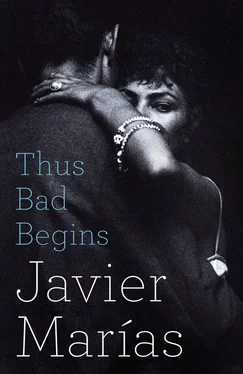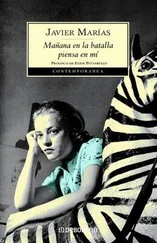In their firstborn, Susana, one could already clearly see (although it was more of a manifestation really) the mother’s candid expression, which both daughters would retain intermittently into their old age (no life is without its intermittencies, and no character is exempt from, on occasions, betraying itself), along with the intimidating, explosive body, which, if I can put it like this, was already beginning to blossom, whether precociously or not I didn’t know nor was I even prepared to think about it: if I refused to take any pleasure in looking at Beatriz, I strictly forbade myself from doing so when in the presence of her promising adolescent daughter, of whom, besides, I only ever caught fleeting glimpses. As for any sexual attraction, Susana and I coincided even less in time and space; she was more like a painting, an inanimate representation, not past but future, as yet unfinished. With their second daughter, there was no danger of my eyes straying: Alicia was twelve when I first went to their apartment, although her resemblance to her mother and her sister would doubtless increase with age. As for the boy, Tomás, who was eight years old, his face was another perfect copy of Beatriz’s. All three were like miniature versions of her, in different sizes. It was therefore impossible to find in them any trace of Muriel, nor, of course, of anyone else, if, that is, another man had participated in the engendering of one of them.
I imagine that neither her unhappiness nor her occupations prevented Beatriz Noguera from being a good mother. Although she did not live solely for them and delegated quite a lot of work to Flavia, she was always available to attend to them, listen to them and console them when necessary, insofar as a woman contemplating suicide, as I later found out, could. She was extremely affectionate and, seeing her embrace and caress her children, one could imagine the kind of affection, at once warm and delicate, that she would have bestowed on Muriel had he allowed her to, or that she had perhaps bestowed on him at another time, a time still invoked by her and not forgotten. However, perhaps as a reflex response — that of the beaten dog — perhaps influenced and inhibited by her husband’s continued rejection of her, she did not go out of her way to lavish affection on her children unless they asked her to. It was as though her whole existence, or her passage through the world, had become tainted with timidity or restraint; perhaps that is how it had been right from the start or perhaps it began at one particular moment. When you’re rejected by the main object of your love, it’s easy to become filled with a general feeling of being surplus to requirements, to feel that any display of affection could be deemed bothersome or undesirable, that the quality of your love has somehow been downgraded and so should never be imposed on others without your first being invited to do so. It saddened me a little to see her waiting for some sign from her children before she dared to pet or pamper them. Fortunately for her, the two younger children still naturally and regularly sought such petting and pampering, and she seized on and enjoyed those occasions, her face bright with contentment, but, at the same time, with a slightly distant, apprehensive look in her eyes, as if she could already see on the horizon an end to such effusions — children grow up and move away and, for far too many years, sink into surliness, and when they do come back, they’re no longer the same — and as if, with some uncontrollably fatalistic part of her mind, she were already saying goodbye to them. Her eldest daughter no longer sought such displays of affection and was more reserved, although her trusting, ingenuous temperament led her to develop a certain sense of camaraderie with her mother, I would occasionally hear the murmur of their talk and their laughter, although these conversations were, nevertheless, short-lived, superficial and the laughter brief, to do with some recent incident or practical everyday matter. It seemed to me sometimes that Beatriz walked about the apartment putting herself in the firing line, if I can put it like that, waiting for someone to summon or approach her and demand her company, her advice, her mediation or help, or as though asking permission with her wary eyes to kiss or embrace them.
She was not, however, an idle woman, as might be inferred from my description of her, and she earned a modest salary, compared, that is, with what Muriel brought in (as well as being modest, it was probably unnecessary as a contribution to their household expenses and she spent it on other things). She taught English at a school three mornings a week and, on a couple of afternoons, gave a few private lessons at her students’ homes, or at least that is the version she gave. I don’t think she had ever studied English systematically, but, born in Madrid towards the end of the Civil War, she had been taken, when still very young, to the United States and had spent part of her childhood, adolescence and early youth there, alternating periods spent in America with time spent in Spain, under the guardianship of an aunt and uncle (who were on good terms with the regime), and in close fraternity with her cousins. She was, out of laziness really, not completely bilingual, but very nearly. Her father, who had not been active during the Civil War and was not initially pursued by the franquistas (although in the 1930s and 40s and even in the 50s, this could change from one day to the next, all it took was some neighbourhood enmity, some old insult or affront to one of the victors, some arbitrary, false accusation, or people desperate to curry favour with the authorities), had succeeded in leaving the country a few months before Madrid was taken by Franco’s troops. A man of moderately Republican, secular views, aware of what the country could become in the hands of the rebels (who would now have a free, unfettered hand), he had been filled with distaste and fear, if not horror and panic, and had made the most of his sudden solitude to leave for France, taking his young daughter with him, despite all the difficulties this would involve and the potential risk to such a small child. From there Ernesto had managed to travel to Mexico with the support of the Foreign Office of that generous country (they cushioned the fall of many who fell at the time), where he stayed for almost a year, until — possibly thanks to the poet Salinas or the poet Guillén, both of whom he had known and admired in Madrid, or directly through Justina Ruiz de Conde — he was given the post of Spanish teacher at Wellesley College in Massachusetts or at Smith or Tufts or Lesley or some other institution near Boston (or perhaps he did the rounds of them all, but who knows in which order), which was considerably steadier and better paid than the sporadic work he found in the insecure world of publishing in a Mexico plagued with compatriot competitors. He had graduated in Philosophy and Literature shortly before the War broke out and, in Spain, had taught at a language school and translated books from German and English, works by Joseph Roth and Arthur Schnitzler, H. G. Wells, Bernard Shaw and Bertrand Russell, among others. He had an excellent grasp of English, although he had never spoken it much and, according to his daughter, even after all his years in America, he never lost his Spanish accent.
She had never quite understood what I described earlier as his ‘sudden solitude’. According to the version she was given as a child, her mother had died shortly after giving birth to her in the midst of a bombardment or when a shell had fallen on the house, leaving a huge hole in the next-door apartment, so they had, all things considered, been very lucky. Her father never went into detail when she asked him about it, sometimes changing the story or contradicting himself, as if he had invented the whole thing as well as the circumstances surrounding it and had never bothered to fix the lie in his imagination or his memory. He rarely spoke about his wife and when he did, his tone was rather cool and indifferent; he wasn’t one of those young widowers who are devastated by their loss and find it terribly hard to recover. On weekends, he would hire a babysitter and go off to Boston, returning late at night. He clearly adored his daughter and cared for her, but with a kind of inherent negligence, after all, he was a man on his own, fairly young and inexperienced, doubtless distracted by his own youth. And so he found it relatively easy to send her off to her aunt and uncle, who often paid for her fare: Beatriz spent nearly every summer and sometimes a whole school year in Spain and, during those stays, she picked up certain comments and insinuations, which escaped — either deliberately or by chance — the lips of those relatives on her father’s side, the only ones she knew or had seen, and who seemed vexed with their brother or brother-in-law, and this had led her to think that perhaps her mother hadn’t died, but had either left her husband shortly after she was born and chosen not to keep the child of a man she bitterly resented or found repulsive or, because of political differences that proved insuperable at the time, had refused to accompany him on his journey into exile and allowed the child to go with him instead of demanding that she remain in her care in Spain. In short, she had either given up her child or the child had been snatched or stolen by her father. It wasn’t until much later that Beatriz dared to ask openly what had happened, in fact, it wasn’t until shortly before her wedding, she was never in much of a hurry to find out. There are some things about which it’s best just to have your suspicions, as long as these are not pressing or unbearable, rather than pursue some disappointing or painful certainty that, as Muriel had more or less said, would oblige you to go on living, meanwhile having to tell yourself a different story from the one you had lived with up until then, always supposing it was possible to cancel out or replace what you had already lived. Or even cancel out or replace what you had believed, if you had believed it for a long time.
Читать дальше












